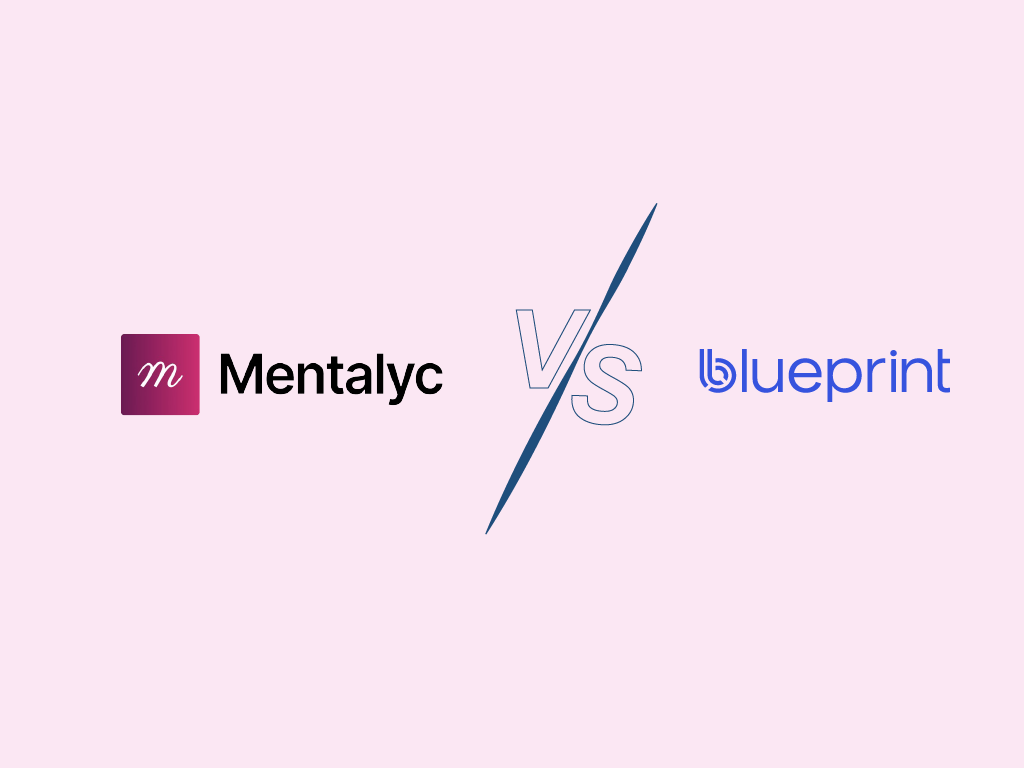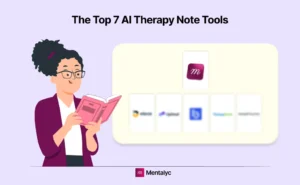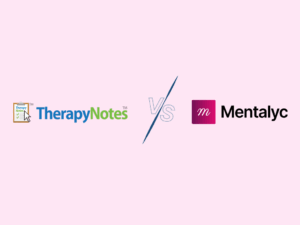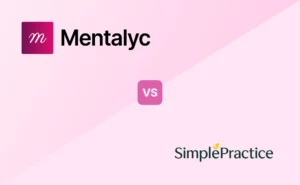Mentalyc vs Blueprint: Feature, Price, Key Comparison
Helping others is your mission – your time is valuable, and your work deserves the right tools. We’ve broken down the strengths and weaknesses of two top AI platforms – Mentalyc vs Blueprint – to help you choose the one that aligns with your values and helps you do what matters most: deliver exceptional care.
According to the APA Monitor, technology is increasingly reducing burnout and boosting productivity for mental health clinicians in 2025. If you’ve been wondering, “Should I use Mentalyc or Blueprint?”, this in-depth comparison is for you. We’ll walk through everything from HIPAA-compliant note-taking for therapists to other features, so you can confidently decide which platform fits your practice best.
Mentalyc vs Blueprint Features Comparison Chart
| Features | Mentalyc | Blueprint |
| HIPPAA & SOC2 compliance | ✅ | ✅ |
| Data not used for model training | ✅ | ❌ |
| Full support for All Client Types (individual, group, couple, family, child) | ✅ | ❌ |
| Recording options (in-person, telehealth, dictation, typing a summary) | ✅ | ✅ |
| SMART Treatment Plan & Progress Tracking | ✅ | ❌ |
| Supervision notes | ✅ | ❌ |
| Therapeutic Alliance Analytics | ✅ | ❌ |
Data Security & Privacy: Mentalyc vs Blueprint for Privacy and Compliance
Mentalyc – data safety & transparency
✅ Mentalyc knows how important confidentiality is in therapy. That’s why it’s built to keep client information safe, secure, and fully compliant with privacy laws like HIPAA, SOC 2, PHIPA, PIPEDA, GDPR and the New Zealand Privacy Act.
✅ Therapists who join Mentalyc receive a Business Associate Agreement (BAA) that legally ensures the platform protects their sensitive data with the highest care.
✅ Mentalyc does not use your data for training AI models, and your data is never shared or sold to anyone.
If you’re comparing “Mentalyc or Blueprint – which is better”, this kind of secure data handling for therapists is a critical factor to consider.
Blueprint – unclear policy for data usage
✅ Blueprint is both HIPAA and SOC2 compliant and provides BAA.
❌ While Blueprint states on its website that it doesn’t use client data to train AI models, its legal terms tell a different story. The language is vague, and the company grants itself a broad license to use clinic data, including the right to generate and own de-identified data. It’s unclear how this data is actually used, and the lack of transparency undermines user trust.
❌ The app’s privacy policy says client data isn’t used by OpenAI for training without explicit consent. However, it’s unclear if the app itself uses this data to improve its own services. This lack of clarity raises concerns that the information may be deliberately presented in a way that misleads potential users – an ethical red flag, especially when sensitive clinical data is at stake.
So, is Mentalyc better than Blueprint when it comes to data protection? Yes. For many therapists, the answer lies in clear and secure data practices.
Notes & Customization: Mentalyc vs Blueprint AI Note Comparison
Mentalyc – trustworthy notes built by a clinician for clinicians
✅ Mentalyc delivers notes that therapists can truly rely on – clear, accurate, and well-organized. Created by a clinician who understands everyday practice, Mentalyc notes meet insurance requirements, so you don’t have to worry about compliance. These are exactly the kind of insurance-ready mental health notes today’s professionals need.
“It’s like having my own personal scribe. The progress notes are accurate and comprehensive.” – Mentalyc’s User
✅ Beyond just intake and progress notes, Mentalyc supports everything from treatment planning, risk assessments, and biopsychosocials to safety plans, making it useful across many therapy fields. From various note formats like SOAP, DAP, MSE notes to therapy modalities like CBT (Cognitive Behavioral Therapy), DBT, Play Therapy, EMDR, Brainspotting, and more, Mentalyc offers flexible, customizable templates to match your unique style and workflow.
✅ Whether you’re a solo practitioner, part of a team, or providing supervision, Mentalyc adapts to your practice and works with all kinds of clients – individuals, couples, families, and groups.
✅ Mentalyc ensures your documentation clearly supports medical necessity, meeting both clinical and insurance requirements.
✅ Mental Status Exam is always accessible to add to your notes.
✅ There is a Risk detection feature that reminds you if the Safety Plan is missing.
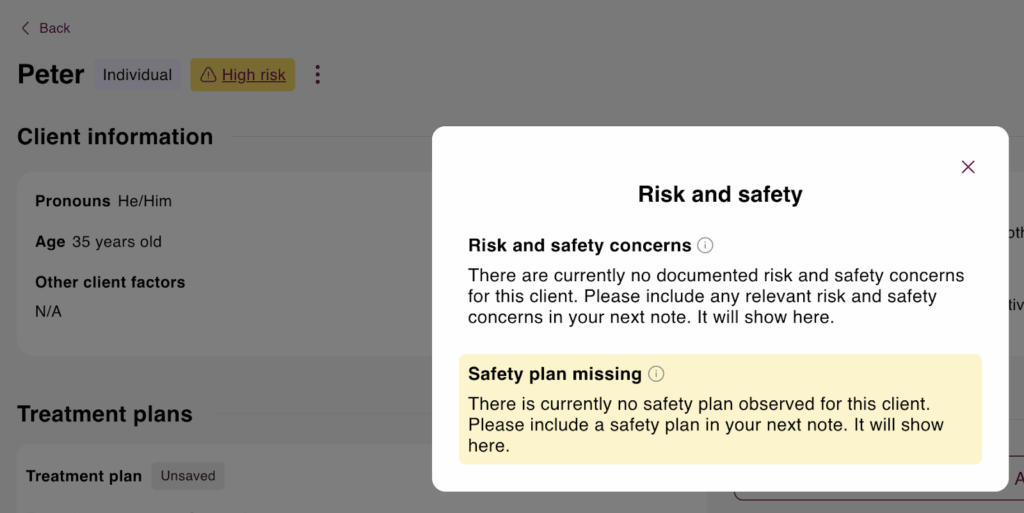
✅ Plus, Mentalyc automatically computes CPT codes to save you time.
❌ Just keep in mind, it’s built specifically for therapists, so there aren’t any notes for physicians.
“As a mental health practitioner, notes can be exhausting. As a practitioner with ADHD, staying on top of notes is an even greater challenge. Mentalyc can take my written process notes, or record sessions, and transcribe into clinical notes suitable for Insurance within just a few minutes. It is my new executive function for clinical notes. Just what I needed.” – Mentalyc’s User
This section gives a clear view for those asking: Blueprint vs Mentalyc – which one to choose? It also adds to the discussion around “Mentalyc vs Blueprint therapy note quality” and the benefits of using automated therapy progress notes for clinical documentation.
Blueprint – accuracy doubts, customization gaps
✅ With the Magic Edit feature, you can customize notes using your own prompts, offering flexibility in how you document sessions. But with that flexibility comes the need for therapists to know how to phrase clear, effective instructions for the AI. It often takes a few tries to get the results you’re looking for, which can add extra time and effort to the note-writing process.
❌ Blueprint doesn’t offer enough flexibility when it comes to customizing notes, especially for specific client groups or therapeutic approaches. For instance, there’s little support for groups or child-focused therapy.
“This is a need in addition to your services because children come to therapy almost as much as adults come to therapy, at least in my practice.” – Blueprint’s User
❌ Blueprint users have voiced frustration over the inconsistent and sometimes inaccurate notes it generates. Key clinical details are often missing, repeated, or poorly structured, making the final notes less useful. As a result, many therapists find themselves spending extra time editing, wondering whether the tool actually helps save time in the end.
So, which AI platform offers more accuracy – Mentalyc or Blueprint? Based on multiple Mentalyc vs Blueprint user reviews, therapists consistently point to Mentalyc’s reliability, while Blueprint appears to fall short.
Blueprint vs Mentalyc – Unbiased Review
In this Mentalyc vs Blueprint AI note comparison, it’s clear that when therapists ask, “Which is better for therapy notes – Mentalyc or Blueprint?”, the consistent feedback from the field leans toward Mentalyc.
So, Blueprint or Mentalyc – what’s better for therapy notes? Your answer may depend on accuracy, flexibility, and customization, which Mentalyc excels in.
Mentalyc vs Blueprint Pricing Comparison
| Feature | Mentalyc | Blueprint |
| Starting Price | USD 14.99 / Month | USD 14.50 / Month |
| Free Trial | YES | YES |
| Customization | ✅ Fully customizable note templates | ✅ Some customization available |
| HIPAA Compliance | ✅ Fully compliant + no stored recordings | ✅ HIPAA-compliant |
| Group Practice Support | ✅ Yes – flexible pricing for clinics | ✅ Yes – Pro/Enterprise plans only |
Recording & Integration: Mentalyc or Blueprint – which one should I use?
Mentalyc – recordings that fit your workflow
✅ You have several flexible options for capturing your therapeutic sessions, whether you’re meeting clients in person or virtually. Video and audio session capture AI tools like Mentalyc let you record directly with the in-app audio tool or stick with your preferred telehealth platform like Zoom.
✅ You can also upload pre-recorded sessions — a great feature if you’re comparing Mentalyc vs Blueprint for private practice flexibility.
✅ Prefer to summarize after the session? You can dictate your notes or type them manually. This gives you control while still benefiting from AI-assisted mental health documentation tools.
Blueprint – flexibility, but not without issues
✅ Available recording options: dictate, upload, recording (in-person, telehealth). Some may wonder “which is the best AI note-taking tool for therapists – Mentalyc or Blueprint?” The answer often comes down to reliability.
✅ Built-in telehealth solution adds convenience.
❌ The in-app recording can be hit or miss and doesn’t always work the expected way. Some therapists say the microphone doesn’t pick up audio clearly, which means parts of the session get lost or the notes end up incomplete.
“I’m having the same issue with blueprint being able to accurately report the note due to lack microphone problems.” – Blueprint’s User
❌ Sometimes, it records only one side of the conversation – either the therapist’s or the client’s – or even adds voices of people who weren’t there. If you’re deciding Mentalyc or Blueprint – which fits your practice best, this is a major concern.
“My words often get mixed up for the client’s words, even when I am very specific once I hit record…I immediately ask, by name, how they’ve been doing so that it can distinguish between the two. Hell, the other day the transcript said there was a third person in the room when there definitely wasn’t” – Blueprint’s User
“Sometimes during telehealth sessions the AI only captures only my audio and not my clients, despite using Chrome and sharing the browser tab audio as suggested.” – Blueprint User
❌ Some therapists find the recording process tedious and not very user-friendly. In some cases, sessions don’t get recorded at all – either because the tool stops listening if voices aren’t detected right away or because it shuts off unexpectedly.
“Why is it so difficult to record? I miss so many sessions because the processs is so tedious. If it doesn’t hear voices right away it turns off. Sometime I hit record before the session to get that “task” out of the way. Only to finish the session and find it never recorded. Also impossible to record on the phone because if I leave the page or even a text message comes in it stops recording. You can add all the bells and whistles in the world but its all mute if I don’t have anything recorded.” – Blueprint’s User
❌ Because of technical glitches and a confusing interface, it’s hard to tell if the recording is actually happening, so some therapists end up constantly watching the audio levels, which pulls their focus away from the session.
“I use BP exclusively for teletherapy sessions. Even when I go through the steps to share browser audio, sometimes BP captures the clients comments for a portion of the session and then later I glance and realize that it is only capturing my voice. I don’t want to have my eyes glued to the green bars to ennsure that BP doesn’t drop my client’s audio halfway through the session.” – Blueprint’s User
These issues become even more disruptive when working with multiple clients, making the choice between Mentalyc or Blueprint for group therapy documentation an important one.
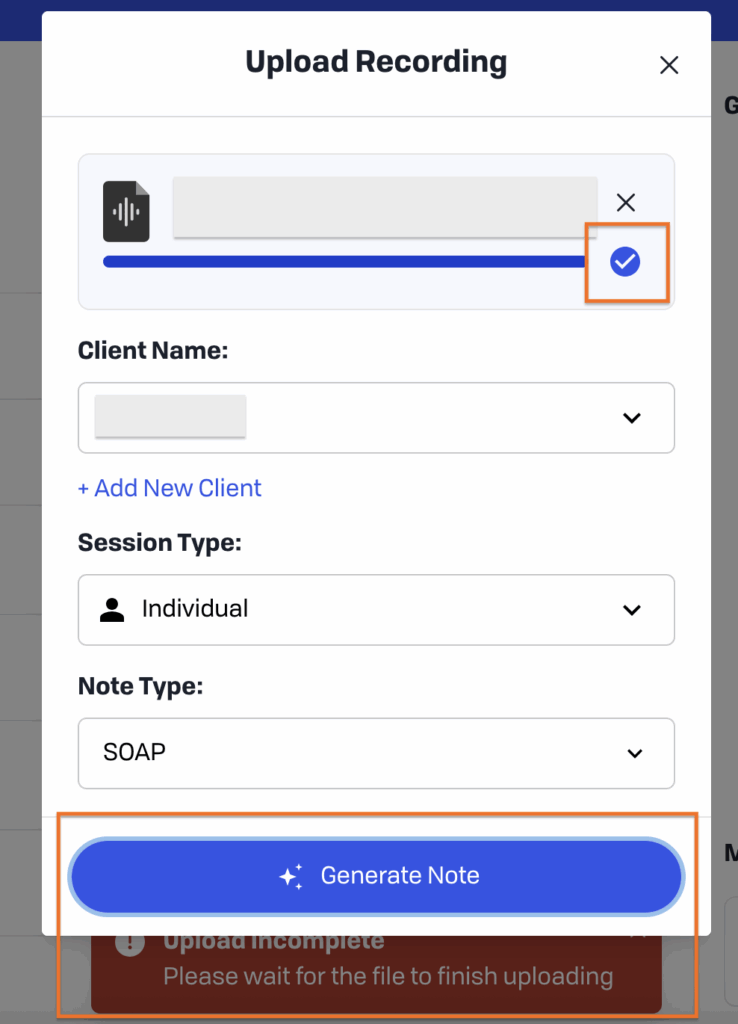
❌ Issues when uploading session files – platform indicates the upload is complete, but then displays an error saying the note cannot be generated. Such glitches are central to the discussion around “Blueprint vs Mentalyc – what therapists are saying” when evaluating reliability.
Treatment Planning & Progress: Mentalyc vs Blueprint – which one handles data better?
Mentalyc – empowering tools for therapist and their clients
✅ Goal-focused treatment plans with SMART objectives, suggestions, and interventions, adaptable to various therapeutic approaches and client types. This makes Mentalyc a top contender for therapy software with treatment planning that’s both flexible and effective.
✅ Golden Thread – Mentalyc ensures note continuity, keeping every step of the therapeutic journey clear and connected – so no important context gets lost.
✅ Progress tracking happens automatically, with intuitive visual dashboards that clearly highlight client growth over time – empowering both therapists and clients to see improvements and stay motivated.
✅ You can use ready-made, audit-proof treatment plan templates or create your own by choosing the sections you want to include. If you’ve been wondering “Mentalyc vs Blueprint – which is better?”, this is one place where Mentalyc stands out.
Blueprint – troubles with smart planning
❌ The Blueprint Treatment Plan is sometimes missing key therapeutic details, such as the diagnosis and relevant skills and goals tailored to specific issues.
“Many times the treatment plan does not match the diagnosis, and there is nothing for trauma. Such as skills and goals.” – Blueprint’s User
❌ The treatment plan lacks section customization, making it difficult to adapt to diverse therapeutic and insurance requirements. The rigid templates often come across as robotic and generic – this is a significant issue, as tailored, individualized plans are essential for audit-proof documentation.
“The blueprint plans are canned and sound robotic and obviously a template.” – Blueprint User
If you’re researching “Mentalyc or Blueprint – best AI for therapists?”, pay attention to how these tools handle individualization and compliance.
❌ While Blueprint can create treatment plans, it fails to document how the client is progressing which is essential for insurance and clinical documentation.
“For insurance purposes we are supposed to highlight how the client is progressing in their treatment. I don’t understand why you can help generate a treatment plan yet don’t highlight any of the progress of said treatment plan in the AI generated notes.” – Blueprint‘s User
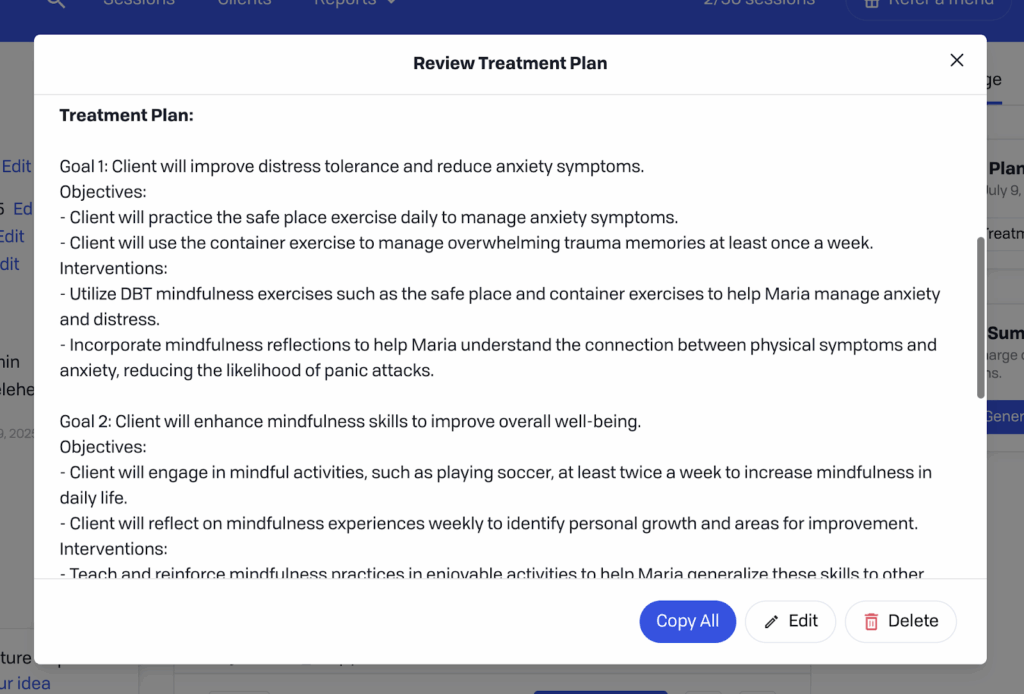
Analytics & Growth: Is Blueprint a good alternative to Mentalyc?
Mentalyc – tracks therapeutic alliance and enhances your impact
✅ Alliance Genie™ works quietly in the background, giving therapists insights about what’s happening in sessions. Think of it as a digital companion that helps spot what you might not notice in real time. After each session, this tool offers a concise summary and actionable suggestions to help you strengthen your practice and build deeper connections with your clients. This level of insight is a major advantage when comparing Mentalyc vs Blueprint for mental health professionals.
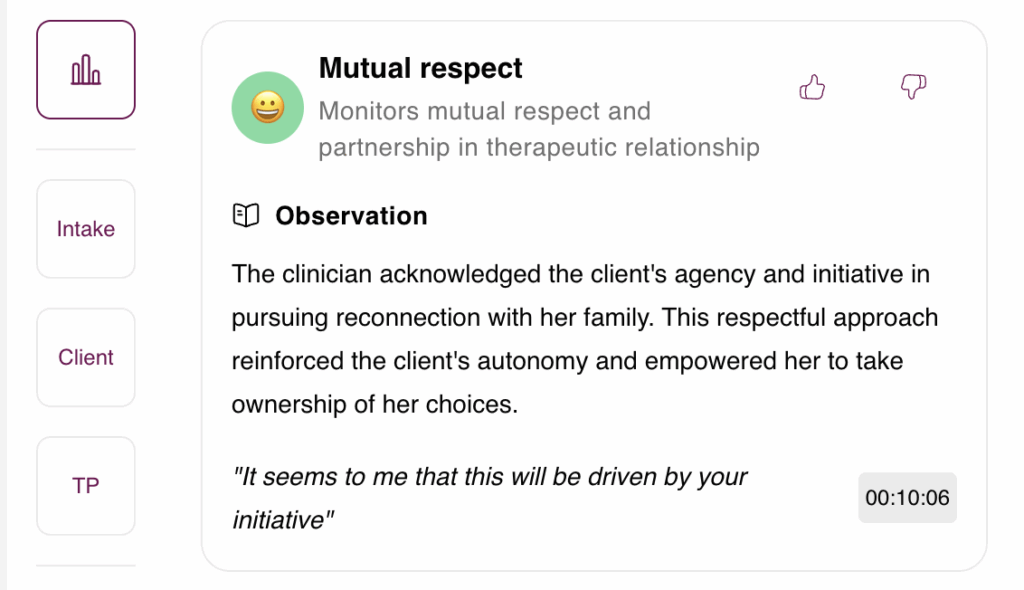
Blueprint
❌ Blueprint promotes a “AI assistant” that’s supposed to surface actionable insights before, during, and after each client session – helping therapists make informed decisions in real time. However, in practice, this feature doesn’t work. It’s impossible to set up, and errors keep appearing, making the smart AI suggestions unusable.
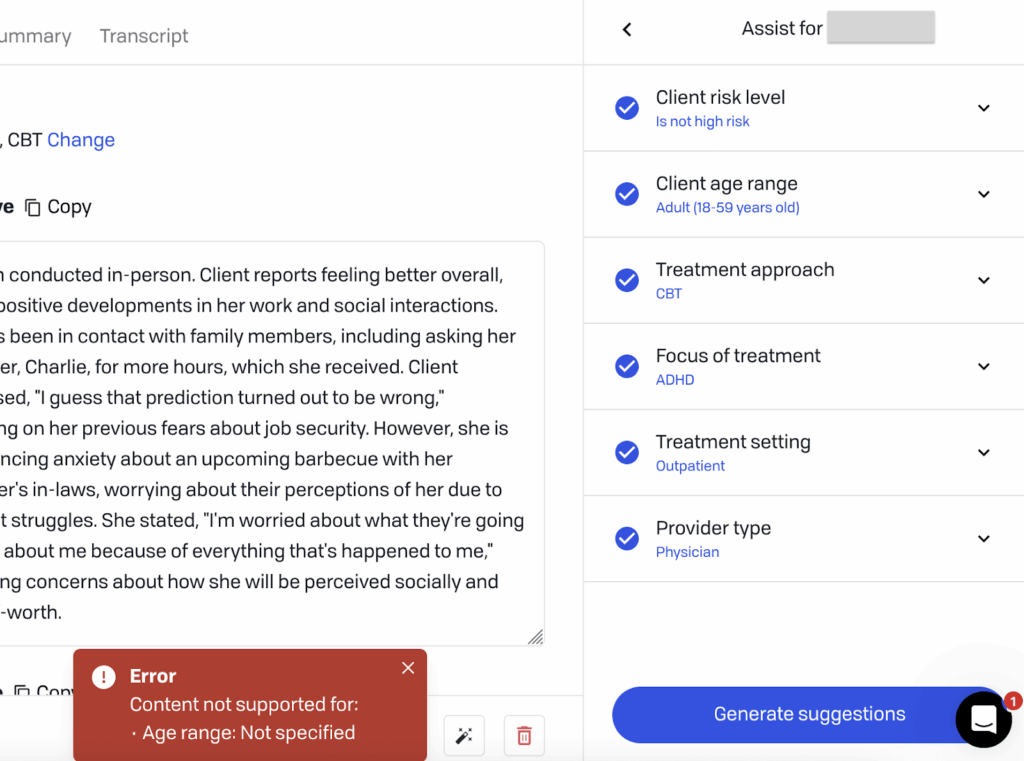
Ease of Use: Mentalyc vs Blueprint reviews from real therapists
Mentalyc – simple and accessible
✅ Mentalyc is easy to use, regardless of your technical background. There’s no steep learning curve, no complicated setup, and no need to wrestle with integrations – simply log in and start using it right away. Plus, a demo note is available to help you explore the output and get a feel for how the system works, all without any hassle. So if you’re wondering “Which platform is better for therapy notes – Mentalyc or Blueprint?”, Mentalyc’s simplicity is a major plus.
✅ Mentalyc is constantly evolving to be more accessible for neurodivergent users, including those with ADHD and autism – prioritizing clarity, simplicity, and reduced cognitive load in both design and functionality. For clinicians seeking more clinician-friendly AI tools, it’s an intuitive and inclusive experience.
“Easy to use, great notes which save me documentation time, protect the client, provide medical necessity, and love the client note so the client can remember what was discussed, goals, and accomplishments in therapy.” – Mentalyc’s User
Blueprint – looks great, takes time to master
✅ A modern interface with calming colors and a clean design. For those comparing “Blueprint vs Mentalyc – pros and cons”, the UI design is a highlight, but that alone may not be enough.
❌ Blueprint is designed with ease of use in mind, but some users find that getting started isn’t entirely plug-and-play. Initial setup – particularly around telehealth configuration, audio tuning, or connecting to certain Electronic Health Records (EHR) systems – can take time and may require some trial and error. These early steps, while manageable, can feel a bit technical, especially for less experienced users.
When evaluating “Which therapy note tool integrates better – Mentalyc or Blueprint?”, the friction-free onboarding of Mentalyc often stands out. And if insurance documentation is your concern, it’s worth considering “Mentalyc or Blueprint – which is more compliant with insurance?”.
In the end, for most therapists exploring “Mentalyc or Blueprint – what to choose?”, usability and reliability often make Mentalyc the more compelling option.
Access to Help & Customer Support
Mentalyc – real help, real humans
✅ Mentalyc offers plenty of useful resources – blogs, articles, FAQs, and in-app tips – but what really makes it stand out is the focus on real human connection. When you need help, you can actually book a call and talk to a real person from Mentalyc’s Team. No bots, no back-and-forth – just real support from someone who’s there to help. If you’re evaluating Mentalyc vs Blueprint pros and cons, this level of personal support is hard to ignore.
“Mentalyc is constantly upgrading their app and has one of the quickest responding customer service teams I’ve encountered.” – Mentalyc’s User
Blueprint – when help takes weeks
✅ Contact with Blueprint Support is available via Email or built-in Help Widget (not a live chat). For anyone comparing therapy software usability for clinicians, the ability to get timely support can make or break the experience.
❌ The Blueprint customer support is not responsive enough. Users experience long delays in receiving help, sometimes waiting up to two weeks for resolution.
Mentalyc vs Blueprint – therapist review 2025:
❌ There is a lack of direct human support – no phone line or live person to talk to – especially for issues that require urgent assistance.
So, when it comes to “Mentalyc vs Blueprint for documentation – which one to pick”, the answer often depends on what you value most in your workflow. If responsive, real-human support is critical to your day-to-day tasks as a clinician, Mentalyc clearly leads the way.
In comparing therapy software usability for clinicians, support and ease of communication become just as important as the core features. After all, what’s the difference between Mentalyc and Blueprint if you can’t get timely help when you need it most?
Blueprint vs Mentalyc – Pros and Cons
| Category | Mentalyc – PROS | Mentalyc – CONS | Blueprint – PROS | Blueprint – CONS |
| Ease of Use | Extremely intuitive UI; built for therapists who aren’t tech-savvy | Learning curve for customizing advanced templates | Clean interface once familiar | Forms can feel overwhelming for some |
| Note Creation Speed | <2 minutes per note using AI-powered transcription | Requires clear audio quality | Custom templates for specific assessments | 10–15 mins manual entry per session |
| Documentation Style | No typing needed – Just speak and Mentalyc writes for you | Needs good session flow for best results | Structured outcome measures available | Rigid forms – not ideal for narrative notes |
| Privacy & Security | No audio/video recordings saved; fully HIPAA compliant | No session recording option | HIPAA compliant | Saves video recordings, raising concerns |
| Treatment Planning | AI helps track progress & adapt care plans | Still improving goal tracking features | Available with structured tools | Not as customizable or intelligent |
Our Choice: Mentalyc
If you’re looking for a system that’s trusted by thousands of therapists, built by experts, and designed to actually work – choose Mentalyc. It’s intuitive, flexible, and adapts to how you work, no matter your technological background. So if you’re wondering “Blueprint or Mentalyc – which platform wins in 2025?”—the answer lies in what actually performs when it matters.
And beyond just privacy, it gives you more than just documentation: it gives you insights that help you track progress, adjust your methods if needed, and make sure therapy is truly moving forward. Is Mentalyc more secure than Blueprint? With Mentalyc’s robust compliance standards and therapist-first approach, it certainly feels that way.
Reliable, smart, and created with therapists – not just for them.
Hear directly from clinicians about the benefits they’ve experienced with Mentalyc:
Why other mental health professionals love Mentalyc

“I really like that the treatment plans make sense, and they’re based on the case notes I’ve been entering.”
Therapist

“Mentalyc makes us therapists be able to do our jobs much better and focus on our jobs — not the busy work — and connect with clients.”
Licensed Clinical Social Worker

“If I were recommending this software to a colleague, I would tell them that it is the best thing that they could do for their practice.”
Licensed Professional Counselor

“It immediately changed my quality of life, personally and professionally. I went from 3–4 hours a week of notes to 1 hour at most … that alone is invaluable personally and professionally.”
Owner/Independently Licensed Marriage & Family Therapist (IMFT)
